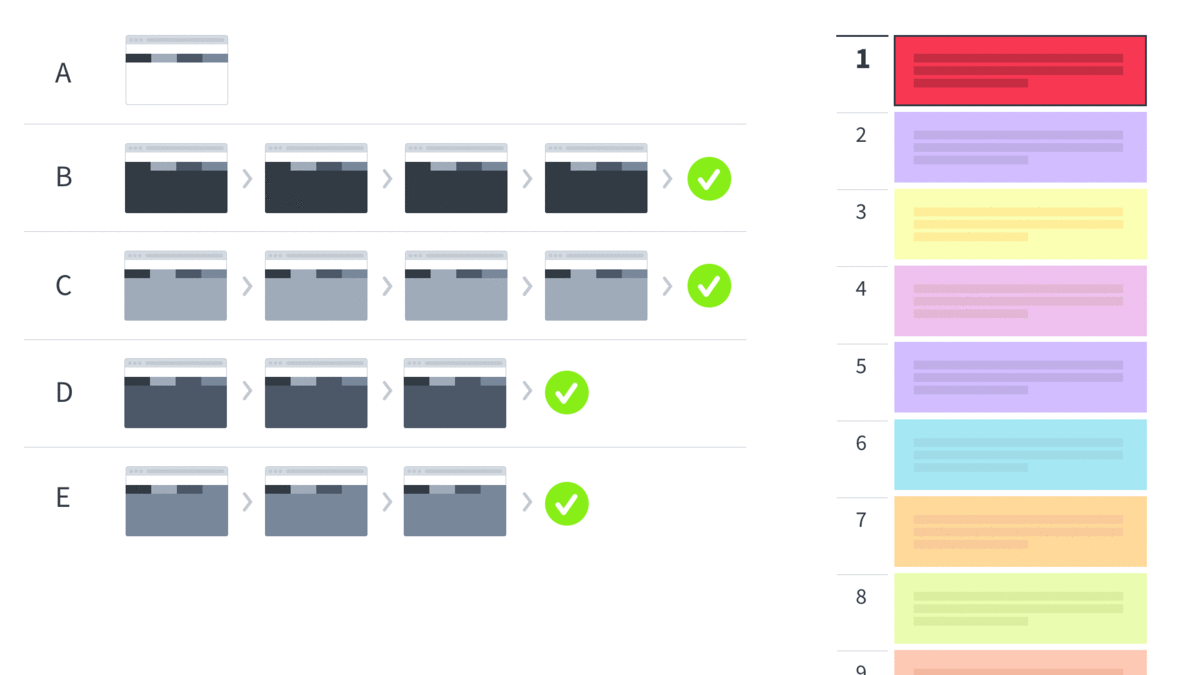The following articles, posts, and presentations are works that I published during my time working at 18F from February 2016 to December 2019.
Eligibility Systems Concept
October 2019 — Written in my personal capacity as I wrapped up my 4-year term at 18F, this piece tried to articulate many of the lessons I’d learned, share ideas that I’d developed, and connect the dots between the various projects I’d worked on. The concept piece describes a perspective for how to approach eligibility systems like those that support a variety of public benefits programs, including six strengths focused on challenging the boundaries we’ve drawn around our systems and the typical distribution of responsibilities. View the concept on Github
Eligibility APIs Initiative
The Eligibility APIs Initiative was a project exploring how federal eligibility-based programs could use a centralized web service—an eligibility API—to deliver machine-readable policy that state systems can integrate with their eligibility & enrollment systems and act on. I founded the effort in June 2017, working on it intermittently until mid-2019. Read more on the Eligibility APIs Initiative’s Github repo.
Exploring a new way to make eligibility rules easier to implement
October 25, 2018 — “When federal agencies issue a policy change, say income eligibility guidelines, that policy gets communicated down to the states as text on the Federal Register or via PDF. This translation of federal policy into many state systems creates opportunities for implementation errors.” Read on the 18F blog
Implementing rules without a rules engine
October 9, 2018 — “If you’re building a rules-based system, don’t assume that you need a separate business rules engine product. Rules can be implemented more easily and with less overhead by cross-functional teams working to describe the rules and policy directly in code using a general purpose programming language like Python, Ruby, etc.” Read on the 18F blog
Encasement & modularity
In 2017-2018, I worked on a long-term capacity building partnership with the Alaska Department of Health and Social Services (DHSS), aimed at establishing an incremental model of legacy modernization. Our cross-functional 18F team work focused on modular procurement, technical prototyping to reduce risk, and establishing a modular experience and a DevOps pipeline. The following pieces stem from this work.
MESC 2019 talk: Reducing Risk and Building Maintainable Systems with Encapsulation
August 21, 2019 – “Medicaid systems need to change for a variety of reasons. Technology, user experience, staff needs, the law and regulations, and more. A loosely-coupled system creates adaptability by allowing smaller components to be upgraded without affecting the rest of the system. But how do we get from a tightly-coupled system to a loosely-coupled one? One key tool for bridging from a legacy system to a new one is encapsulation, which involves making legacy data available outside of the legacy system through an API layer. New components can then be built or bought and loosely-coupled together without data loss, service outage, or that risky switch flip. We’ll talk about the encapsulation strategy in more depth, give some examples of its use in practice, and tools to determine high-impact places to encapsulate your own systems. Download PDF with notes.
Modular contracting and working in the open
October 25, 2018, written with Mark Headd — “Working in the open is a key component of building trust between governments and vendor partners. Read about how the State of Alaska is using openness and code sharing to foster greater trust between government project teams and vendor teams as part of a large legacy system overhaul.” Read on the 18F blog
Modular product design strategy
August 2017 — From the AK Health Github repo: “Alaska is shifting development of the ARIES system to a more fully modular approach. Beyond technical modularity, which was begun with the initial ARIES development, we’ll also be utilizing modular procurement and modular product design techniques. Read on the AK Health Github repo

Incrementally shifting toward a modular experience presentation
August 2017 — From the AK Health Github repo: “To facilitate this modular approach to system development, we will be incrementally shifting toward a modular product architecture. New development will be “loosely coupled” to the existing product. We’ll then incrementally shift responsibilities to the new modules.” Read on the AK Health Github repo
Collaborating
2016 — I’m not exactly sure of the date, but it was early during my four years at 18F. I first gave a version of this talk as part of a brown bag lunch at Civic Hall, where 18F staff in NYC worked at the time. After I gave it, I was asked to share it at one of 18F’s All-hands meetings. I was compelled to put this together because I was seeing a pattern recur that I had experienced through my work on HealthCare.gov. I wanted to help my colleagues engage with our government partners with empathy. Download the presentation

 Default: Small
Default: Small Small 1
Small 1 Small 2
Small 2 Medium
Medium Medium 1
Medium 1 Medium 2
Medium 2 Large
Large Large 1
Large 1 Large 2
Large 2